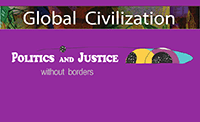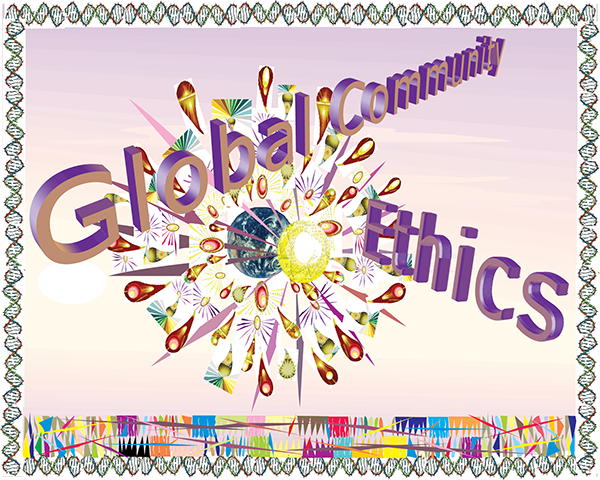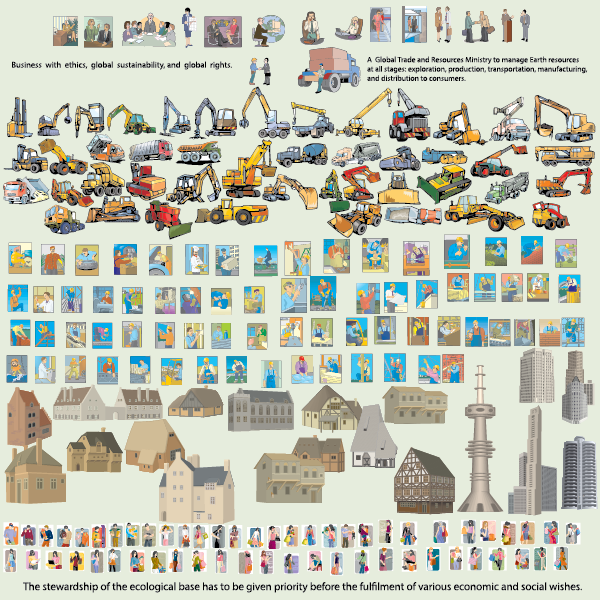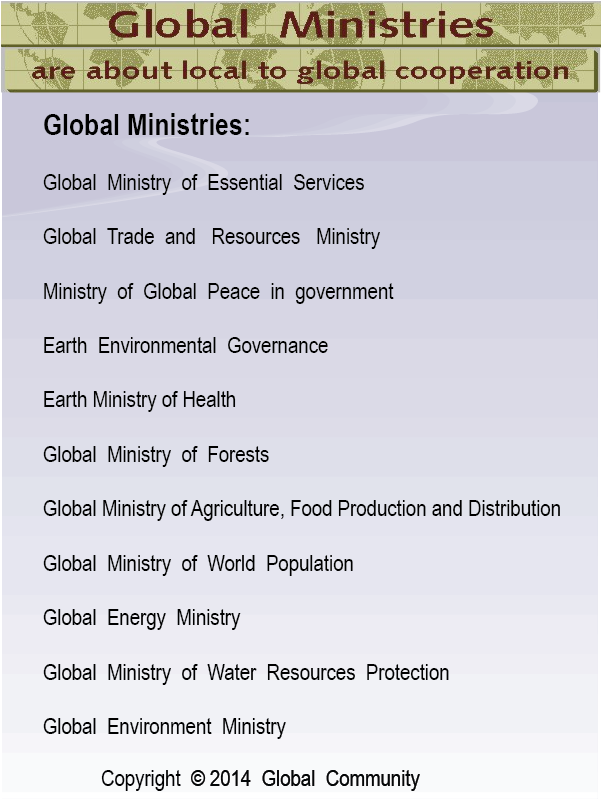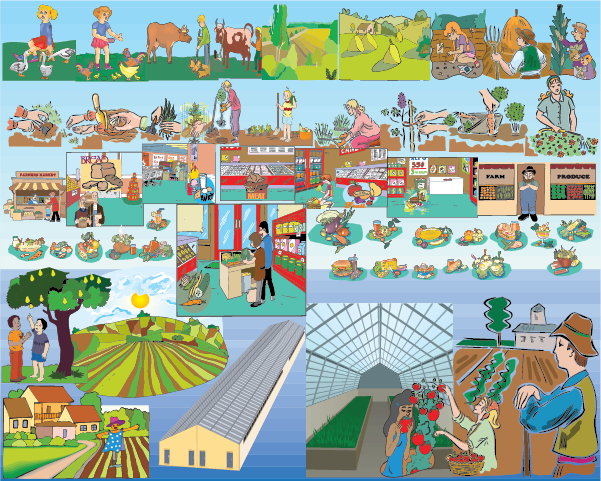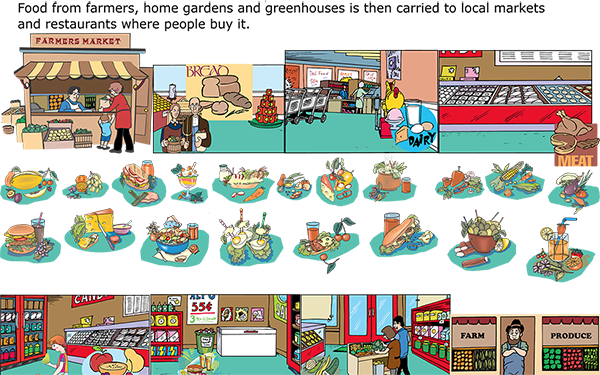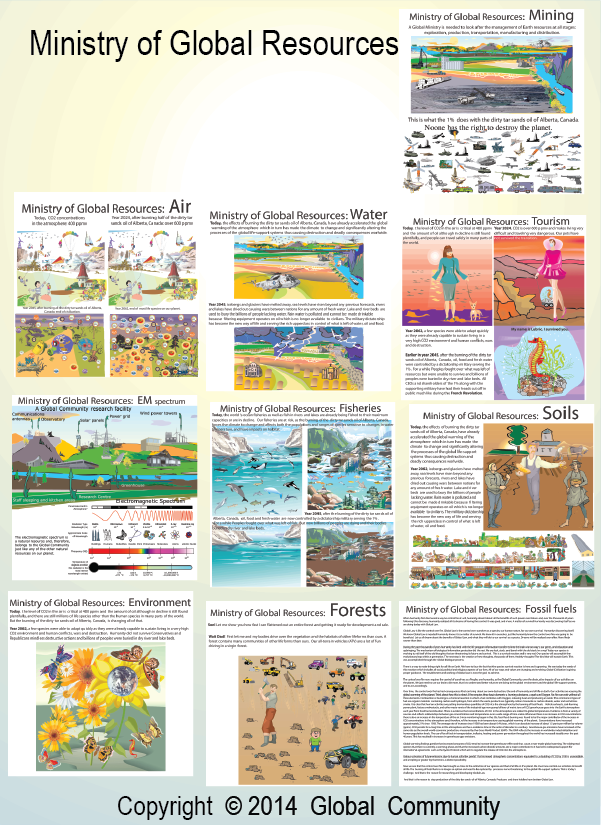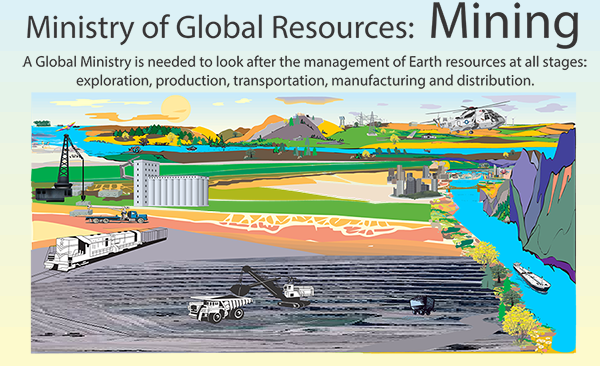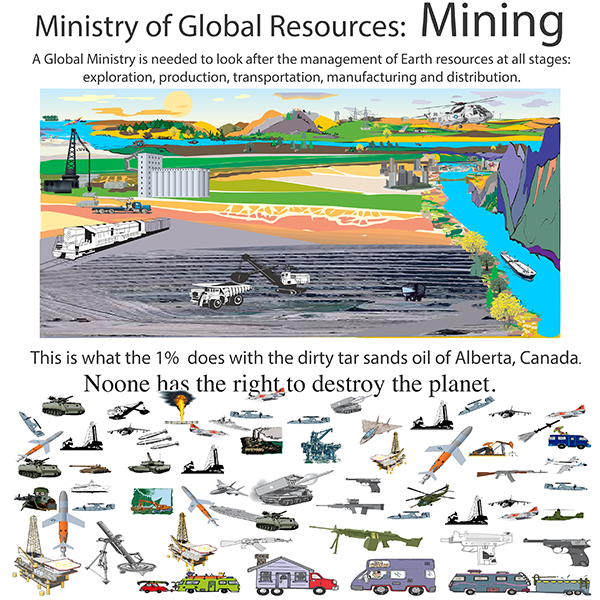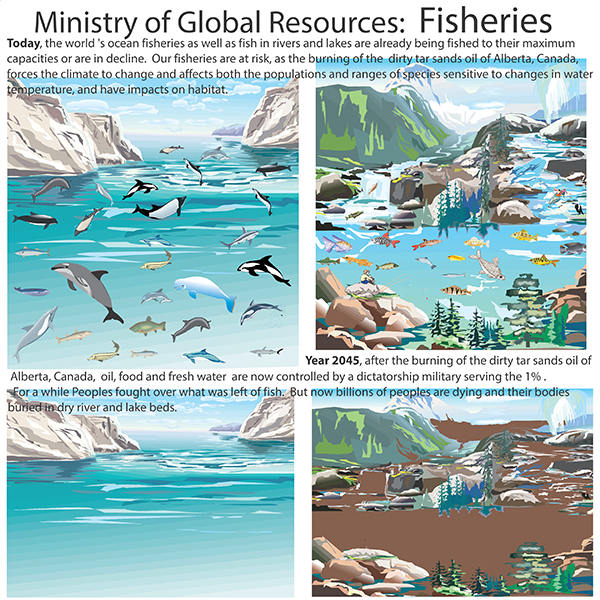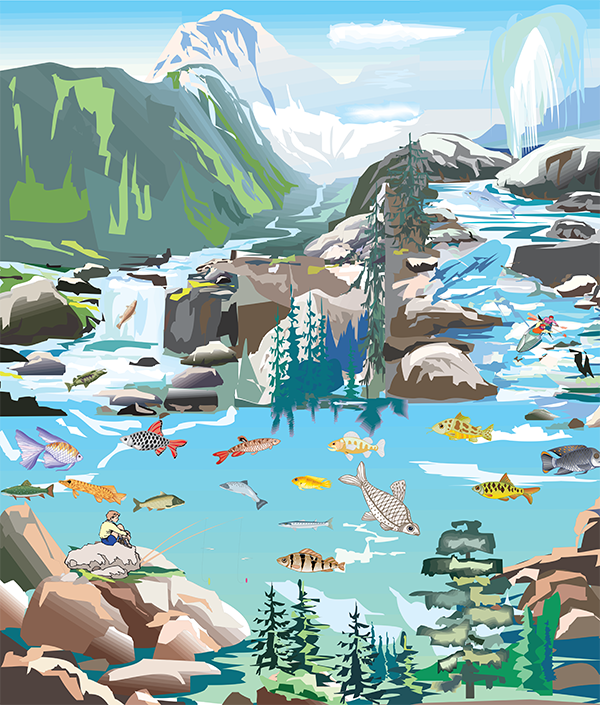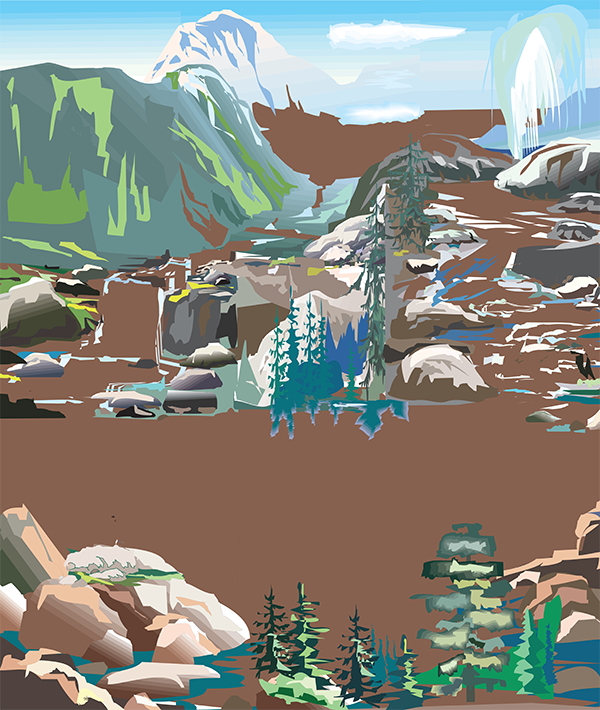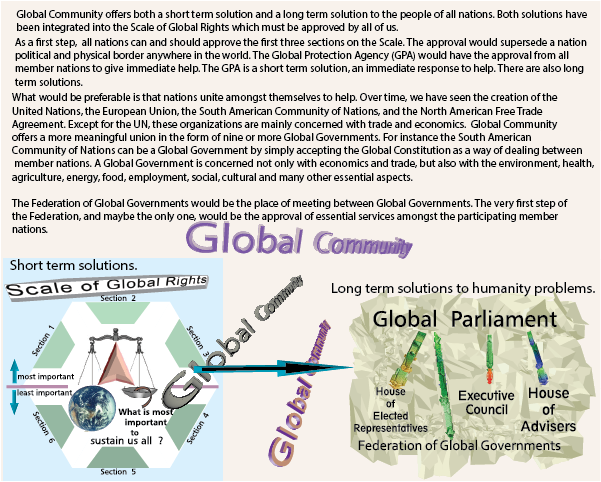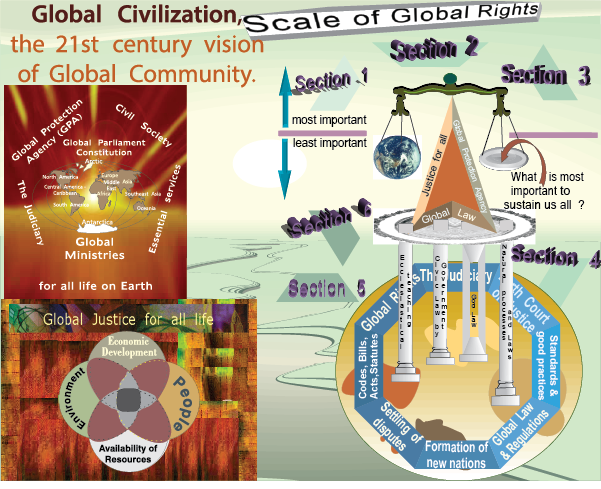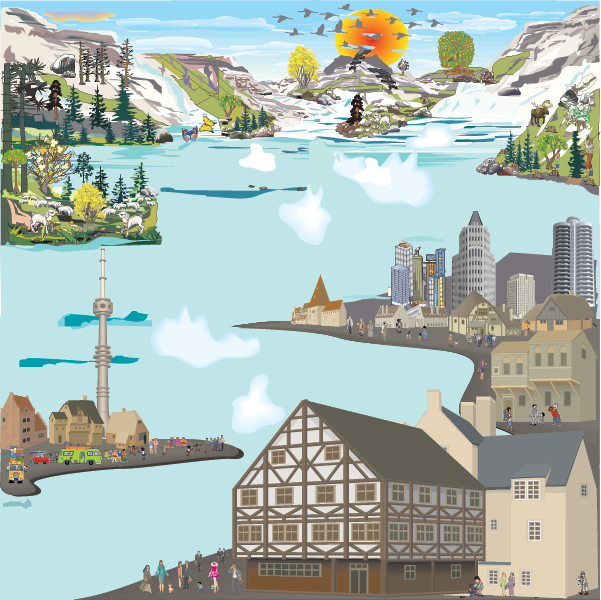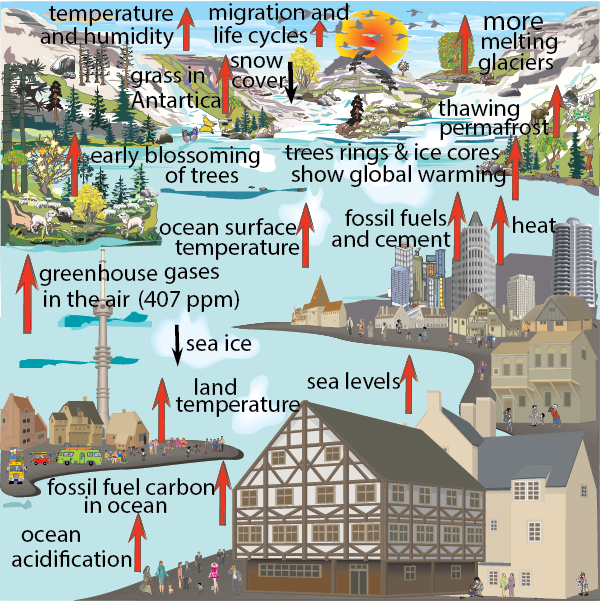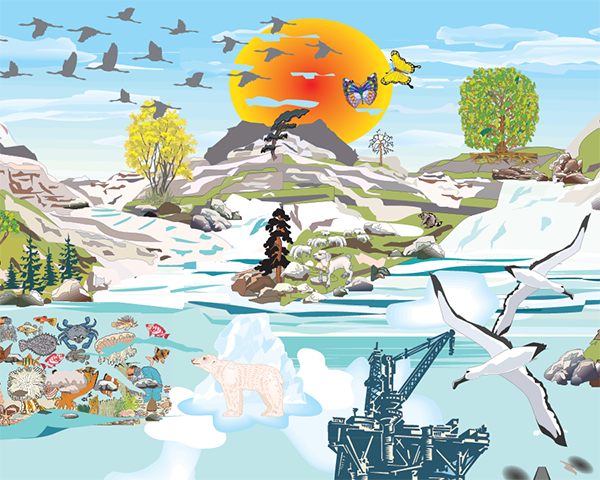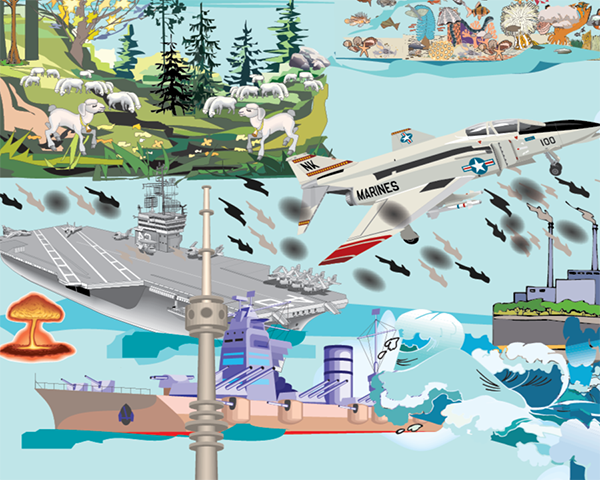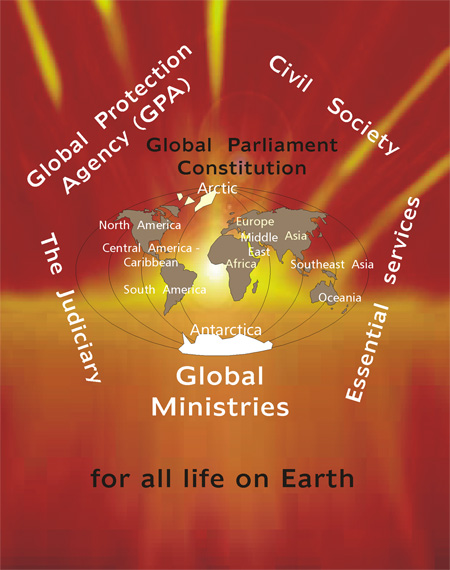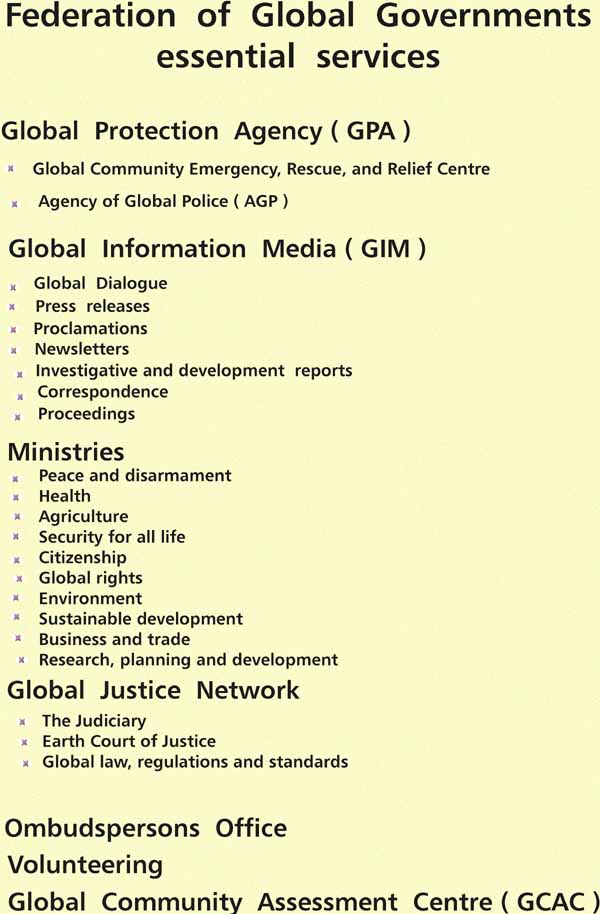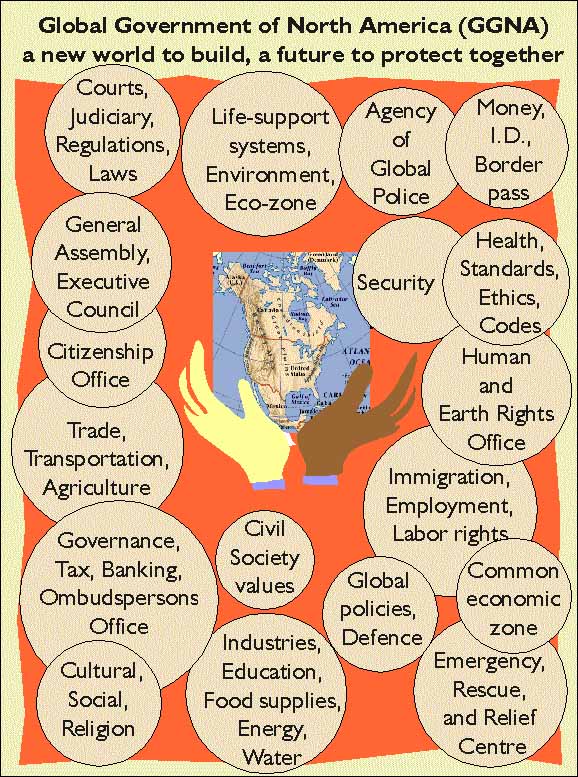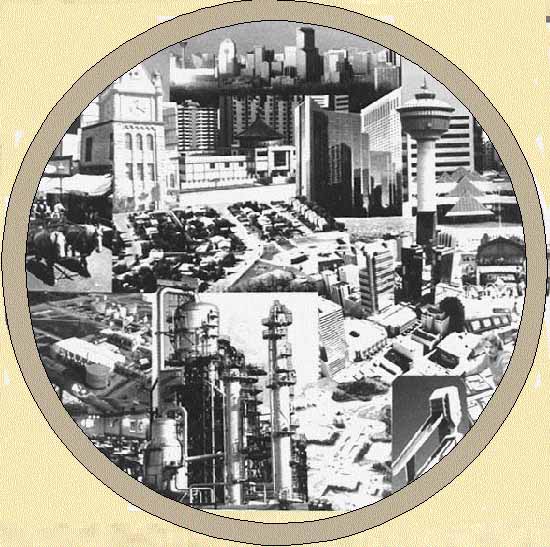Global Trade and Resources Ministry (GTandRM) proposal over time since 1985.
Table of Contents of July 2018 Newsletter
June 2018 - Global Trade and Resources Ministry (GTandRM) proposal over time since 1985. |
We are the first species on Earth that will have to limit itself for its own survival and that of all life.
This picture was designed in 1985 by Germain Dufour, and represented at the time the vision of the world in 2024. The picture was all made of symbols. At the back is "the wall" where a group of people are making sure those coming in have been properly check out before being let in. Many of the requirements for being let in have already been defined and described over time in many of the monthly Newsletters published by Global Civilization. In the middle is a couple with a child actually going through the screening process. At the front people from all over the world are waiting to be checked in as global citizens. The 2 star like objects that seem to be flying above the people are actually drone-like objects keeping peace and security.
Global Government of North America (GGNA).
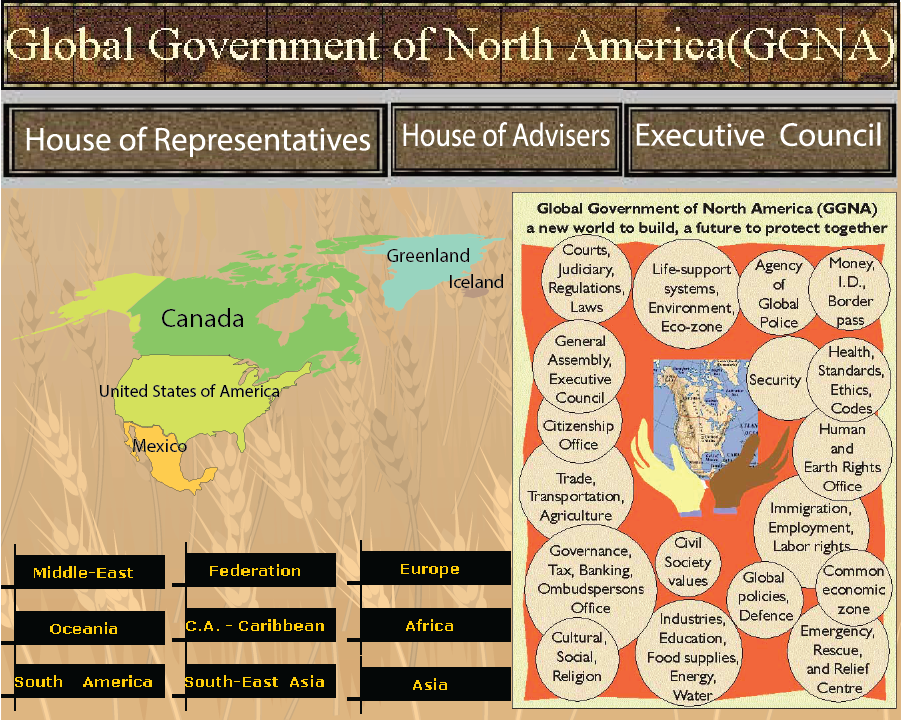
Welcome to the Global Civilization of North America (GCNA).
(Note: pictures and their enlargements are found in previous Newsletters
![]()
![]()
![]() )
)
![]()
![]()
![]()
![]() ]
]![]() ]
]![]() ]
]![]() ]
]![]() ]
]![]() ]
]![]() ]
]![]() ]
]![]() ]
]![]() ]
]![]() ]
]![]() ]
]![]() ]
]
|
Global ministries are a very specific and useful type of symbiotical relationships on Earth. There are urgently needed. Global Community has been promoting the formation of 51 global ministries for the proper governance of Earth. Global ministries are world wide organizations just like the WTO for trade and therefore should have the same power to rule on cases as that of the World trade Organization (WTO). |
Global ministries are a very specific and useful type of symbiotical relationships on Earth. There are urgently needed. Global Community has been promoting the formation of 51 global ministries for the proper governance of Earth.
Global ministries are world wide organizations just like the WTO for trade and therefore should have the same power to rule on cases as that of the World trade Organization (WTO).
A sustainable world can be built with the help of a very powerful entity: the human spirit. Community participation generates the energy needed to sustain the planet and all life. Religious and environmental communities have formed a powerful alliance for sustainability.
In today's Global Community it is important for our survival to cooperate globally on several aspects such as peace, security, pollution in the air, water and land, drug trade, shelving the war industry, keeping the world healthy, enforcing global justice for all, eradicating poverty worldwide, replacing the Universal Declaration of Human Rights by the Scale of Global Rights, and entrenching the Global Constitution as a way of life for the good of all.
Global Community is inviting you to participate in the formation of global symbiotical relationships between communities, nations, businesses, or a combination of them. This can be accomplished through the formation of global ministries.
The formation of global ministries is the most important event in human history. Humanity sees the need to manage the world affairs in several aspects of our lives: energy, agriculture, environment, health, Earth resources, Earth management, security and safety, emergencies and rescues, trade, banks, speculation on world markets, peace, family and human development, water resources protection, youth, education, justice, science and technology, finance, human resources, ethics, human and Earth rights, sustainable development, industry, and manufacturing products, etc. Global ministries will be given power to rule themselves in harmony with each other. The WTO will not be the only global ministry that can rule on cases related to trade.
|
Earth Environmental Governance can only be achieved successfully within the larger context of Sustainable Developent and Earth Management.
|
Earth Environmental Governance can only be achieved successfully within the larger context of Sustainable Developent and Earth Management. All aspects are
inter-related and affect one another.
A healthy environment is essential to long term prosperity and well-being of Global Community citizens. That demands a high level of ecological protection. This is the 'raison d'etre' of the Scale of Global Rights.
Primordial human rights are those human rights that individuals have by virtue of their very existence as human beings: to live,
eat, drink fresh water, breath clean air, and have shelter. These rights are separate categories than ecological rights, the right
of the greatest number of people, economic rights, social rights, cultural rights and religious rights. Ecological and primordial human rights
are the only rights that have existed unchanged throughout the evolutionary origin of our species. Any major change would have
threatened our very existence. All other human rights listed here are rights created by human beings and can be changed depending
of new circumstances; they are not stagnant but are rather flexible and adaptive, and they can evolve. Ecological and primordial human rights
of this generation and of future generations are therefore much more important than any other human rights existing now and in the future.
In this way the Scale of Global Rights gives us a sense of direction for future planning and managing of the Earth.
Earth management is now well defined and becomes a goal to achieve. We no longer waste energy and resources in things that are
absolutely unimportant.
It has also become a necessity of establishing the Global Trade and Resources Ministry ![]()
![]() that will be assessing, compiling, managing and protecting Earth resources, and the Earth Court of Justice prosecuting cases involving crimes related to the relentless misused of the Earth resources.
that will be assessing, compiling, managing and protecting Earth resources, and the Earth Court of Justice prosecuting cases involving crimes related to the relentless misused of the Earth resources.
![]()
May 2018 - Global Trade and Resources Ministry (GTandRM) proposal over time since 1985. |
Global Civilization
Short and long term solutions to saving the world.
The formation of global ministries is the most important event in human history. Global Civilization values did not all exist at first during the early stage of human evolution. Most of them gradually developed over time. Today, it is not just about 'humanity survival' but also 'all lifeforms survival' on Earth we are fighting for. We need to create a Global Ministry for the economic sharing, production and distribution of resources on our planet. In fact, we need global ministries for the proper management of the most important global commons, those concerned with the global life-support systems, without which no one could survive on our planet.
What would be preferable is that all nations unite amongst themselves to form a more meaningful union of nine or more Global Governments. A Global Government is concerned not only with economics and trade, but also with the environment, health, agriculture, energy, food, social, cultural and many other essential aspects of community. We want each Global Government to take a larger share of responsibility of the specific region where it operates, and be more accountable to the people of that region. The Federation of Global Governments would be the place of meeting between Global Governments.
Global Parliament shall be composed of four (4) bodies, designated as follows:
1. the House of Elected Representatives, to represent Global Community directly and equally;
2. The Federation of Global Governments, to represent the nations of the world;
3. House of Advisers with particular functions to represent the highest good and best interests of humanity as a whole; and
4. the Executive Council
Global Parliament primary goal and focus include only a few essential aspects. Global Parliament Constitution itself gives the highest priority to the following essential aspects of life within civil society:
* essential services;
* the Judiciary;
* the Global Protection Agency (GPA); and
* Global Ministries.
The very first step of Federation Global Parliament, and maybe the only one for several decades ahead of us, would be the approval of essential services amongst the participating member nations.
April 2018 - Global Trade and Resources Ministry (GTandRM) proposal over time since 1985. |
Business, trade and ethics.
Global Civilization ethics for a business are about how we treat others and a commitment to respect every person humanely and with dignity. For this process to work, global citizens learn to forgive, be patient and compassionate, promote acceptance, open theirs hearts to one another, and practice a culture of solidarity and cooperation. Let go narrow differences between us all for the greater good of humanity and future generations.
Morality can be derived from a standard that global citizens believe should be universal such as Global Civilization ethic for a business which include all lifeforms. Global Civilization ethic for a business aims to identify principles of right action that may be used to guide people in their lives. These principles can be used to decide whether particular courses of action, or particular types of action, are right or wrong. Ethics emphasizes respect for persons, and holds that there are certain actions that should never be done.
Wherever there are people, there will be conflicts, and ethics can help to resolve conflicts. Global Civilization proposes that such conflicts be resolved without violence and within a framework of justice. People must commit themselves to the most nonviolent, peaceful solutions possible. This is the pathway to global peace.
Over ancient time to this day, morality in society made its way into our ways of doing business. So the set of behaviors that constitute Global Civilization ethic for a business evolved largely because they provided possible survival benefits to increase evolutionary success. Consequently, Peoples evolved socially to express emotions, such as feelings of empathy or guilt, in response to these moral behaviors. Humans developed truly moral, altruistic instincts. When looking across cultures of geo-cultural areas and across millennia, certain virtues have prevailed in all cultures, the major ones include wisdom, knowledge, courage, justice, love, truth, empathy, kindness, and social intelligence. These virtues were not always incorporated into the ways of doing business because the 1% business world became corrupted, greedy, no longer in line with humanity's survival on the planet, and more interested in keeping most of the wealth, resources and power for themselves keeping the remaining 99% of the world population in poverty. But today we are going to incorporate these virtues and proper behaviors into corporate citizen global ethics.
Global Civilization promotes the formation of several global ministries for the proper governance of Earth.
Over the past decades, Global Civilization has been promoting the formation of several global ministries for the proper governance of Earth. Global ministries are world wide organizations just like the World Trade Organization (WTO) for trade and therefore should have the power to rule on cases as that of the WTO.
The formation of global ministries is the most important event in human history. Humanity sees the need to manage the world affairs in several aspects of our lives: energy, agriculture, environment, health, Earth resources, Earth management, security and safety, emergencies and rescues, trade, banks, speculation on world markets, peace, family and human development, water resources protection, youth, education, justice, science and technology, finance, human resources, ethics, global rights, sustainable development, industry, and the manufacturing and distribution of products. Global ministries will be given power to rule themselves in harmony with each other.
Today, earquakes, cyclones and other natural disasters, as well as human made global destruction and disasters, require a rapid and efficient response from the world to help those in needs. All of this can be effectively accomplished when the organizational structure of the government of each nation-state includes a Global Ministry of Essential Services in government. We can all co-operate together better this way when all people are prepared and able to do so.
There is a need to manage the entire process of using Earth natural resources. Because of the limited quantities of Earth resources to be made available for this generation and the next ones, and because of environmental, climate change, and world population concerns, there is a need to manage the entire process of using Earth natural resources. And we all know that the amount of oil left in the ground in the world has already passed its peak quantity. So why waste the oil on doing things we know are nothing but a waste of energy and often used for destruction and certainly will shorten the life span of the next generations. A Global Trade and Resources Ministry is needed to look after the management of Earth resources and trade at all stages: exploration, production, transportation, manufacturing and distribution.
A corporation will now be required to operate its business Global ethic for a business must always be grounded in realities. New way of doing business within Global Civilization as per global ehtics:
* Be concerned with issues such as climate change, bio-diversity, pollution prevention and adopt high standards;
* Minimize environmental degradation and health impacts;
* Be responsible for the environmental impact of its products and services throughout their cycle;
* Adopt a wide environmental code, and policies, health and safety practices and procedures aimed at reducing resource and energy use in each stage of a product or service life-cycle;
* Set up appropriate management systems to implement policies;
* Conduct annual checks and balances and provide reports to the community;
* Respect the political jurisdiction of national communities;
* Respect human rights, social and cultural rights ;
* Recognize its political and economic impact on local communities;
* Contribute to the long-term social, cultural, environmental and economic sustainability of the local communities;
* Respect the rights of indigenous peoples, their culture and land, and their religious and social customs; provide employment and training opportunities ;
* Ensure that each employee is treated with respect and dignity and is not subjected to any physical, sexual, psychological or verbal harassment or abuse;
* Respect employees' right to freedom of association, labour organization, and free collective bargaining;
* Provide equal pay for work of equal value;
* Recognize the responsibilities of all workers to their families, and provide for maternity leave, and paternity leave;
* Ensure that their be no barriers to the full participation of women within the company;
* Participate in the creation of child care centres and centres for the elderly and persons with disabilities where appropriate;
* Ensure no discrimination on grounds of race, ethnicity, or culture;
* Ensure that persons with disabilities who apply for jobs with the company receive fair treatment and are considered solely on their ability to do the job;
* Provide resources and facilities which enable them to achieve progression in employment in the company;
* Provide training to all employees to conduct their activities in an environmentally responsible manner;
* Work with organizations concerned with children's rights, human rights and labour rights to ensure that young workers are not exploited;
* Ensure that a mechanism is in place to address ethical issues of concern raised by employees;
* Make sure that the company's policies balance the interests of managers, shareholders, employees, and other affected parties;
* Adhere to international standards and protocols relevant to its products and services;
* Adopt marketing practices which protect consumers and ensure the safety of all products;
* Conduct or support research on the environmental impacts of raw materials, products, processes, emissions and wastes associates with the company and on the means of minimizing such adverse impacts;
* Make a sustainable use of renewable natural resources such as water, soils and forests;
* Conserve non-renewable natural resources through efficient use and careful planning; and
* Conserve energy and improve energy efficiency of internal operations and of the goods and services being sold.
Ever since 1985, Global Civilization has proposed and developed the formation of Global Ministries:
* Global Trade and Resources Ministry
* Global Ministry of World Population
* Global Ministry of Essential Services
* Ministry of Global Resources
* Ministry of Global Peace in government
* Earth Environmental Governance
* Earth Ministry of Health
* Global Ministry of Forests
* Global Ministry of Agriculture, Food Production and Distribution
* Global Civilization Ministry of Peace and Disarmament
* Global Energy Ministry
* Global Ministry of Water Resources Protection
* Global Environment Ministry
Humanity sees the need to manage the world affairs in several aspects of our lives. At the present time, the formation of global ministries is the most important event in human history. We need to create a Global Trade and Resources Ministry for the economic sharing, production and distribution of global resources. We also need global ministries for the critical management of all other essential global commons.
Global Civilization is calling for the immediate formation of the Global Trade and Resources Ministry.![]()
![]()
Global Civilization has shown that at the world level, there will not be sufficient agricultural production to meet increases in demand over the next thirty years. By 2030, climate change due to global warming will start having significant impacts on food production, and crop production in developing countries is projected to be significantly less than in the 1990s. A global ministry on food production and distribution is therefore a most needed institution. We will have to produce less livestock as we effectively double the population we need to feed: ourselves, plus the livestock that is supposed to be feeding us. We also have to apportion the land surface of the whole world more efficiently, using some for highly intensive food production (which makes use of less land), some for extensive agriculture (combining food production with wildlife conservation) and designing some specifically as wilderness areas with global corridors between them.
http://globalcommunitywebnet.com/Dialogue2018/Newsletters/April2018/Anewglobalorderwithavision.html
Germain: Fix the links next here to correspond to this file.
Table of contents
- Business ethics: corporate global citizens responsibility and accountability.
- Global Ministries.
- Short and long term solutions to saving the world, the Scale of Global Right and Global Parliament.
1. Short term solution
2. Long term solution
- Conclusion
March 2018 - Global Trade and Resources Ministry (GTandRM) proposal over time since 1985. |
| Business ethics: corporate global citizens responsibility and accountability |
Governance of the Earth by Global Parliament will make the rule of arbitrary power--economic (WTO, FTAA, TPPA, BRICS, EU, etc.), political, or military (NATO)-- subjected to the rule of law within the global civil society, the human family. Justice is for everyone and is everywhere, a universal constant. Justice is without borders.
The quality of Earth governance is reflected in each local community worldwide. Global Community will show leadership by creating a global civil ethic within our ways of life. Global Constituion describes all values needed for good global governance: mutual respect, tolerance, respect for life, justice for all everywhere, integrity, and caring. The Scale of global Rights has become an inner truth and the benchmark of the millennium in how everyone sees all values. The Scale encompasses the right of all people to:
* the preservation of ethnicity
* equitable treatment, including gender equity
* security
* protection against corruption and the military
* earn a fair living, have shelter and provide for their own welfare and that of their family
* peace and stability
* universal value systems
* participation in governance at all levels
* access the Earth Court of Justice for redress of gross injustices
* equal access to information
An investigation was conducted to found whether or not transnational corporations (TNCs) and other companies are taking meaningful steps to improve their social and environmental record. Considerable attention is focused on the effectiveness of "voluntary initiatives" such as codes of conduct, social and environmental reporting, certification, labelling, corporate social investment and improvements in environmental management systems.
Earth environmental governance can only be achieved successfully within the larger context of sustainable developent and Earth management. All aspects are inter-related and affect one another. A healthy environment is essential to long term prosperity and well-being, and citizens in Global Civilization demand a high level of ecological protection. This is the 'raison d'etre' of the Scale of global Rights. On the Scale, primordial human rights and the protection of the global life-support systems (ecological rights) are on top of the Scale. They are the most important aspects. Primordial human rights
| Global Community proposes to corporations that they take responsibility on behalf of society and people, and that they should pay more attention to global rights, working conditions and getting ride of corruption in the world of business and trade. We have developed a criteria, and we ask you to turn it into practice. |
Apply to us to be a global corporate citizen of Global Civilization .
A Certified Corporate Global Community Citizenship
You can obtain the citizenship after accepting the Criteria of Global Community Citizenship
GCAC will be conducting the assessment of your business.
Corporate citizen global ethics
A corporation will now be required to operate its business as per global ehtics:
* Be concerned with issues such as climate change, bio-diversity, pollution prevention and adopt high standards
* Minimize environmental degradation and health impacts
* Be responsible for the environmental impact of its products and services throughout their cycle
* Adopt a wide environmental code, and policies, health and safety practices and procedures aimed at reducing resource and energy use in each stage of a product or service life-cycle
* Set up appropriate management systems to implement policies
* Conduct annual checks and balances and provide reports to the community
* Respect the political jurisdiction of national communities
* Respect human rights, social and cultural rights
* Recognize its political and economic impact on local communities
* Contribute to the long-term social, cultural, environmental and economic sustainability of the local communities
* Respect the rights of indigenous peoples, their culture and land, and their religious and social customs; provide employment and training opportunities
* Ensure that each employee is treated with respect and dignity and is not subjected to any physical, sexual, psychological or verbal harassment or abuse
* Respect employees' right to freedom of association, labour organization, and free collective bargaining
* Provide equal pay for work of equal value
* Recognize the responsibilities of all workers to their families, and provide for maternity leave, and paternity leave
* Ensure that their be no barriers to the full participation of women within the company
* Participate in the creation of child care centres and centres for the elderly and persons with disabilities where appropriate
* Ensure no discrimination on grounds of race, ethnicity, or culture
* Ensure that persons with disabilities who apply for jobs with the company receive fair treatment and are considered solely on their ability to do the job; provide resources and facilities which enable them to achieve progression in employment in the company
* Provide training to all employees to conduct their activities in an environmentally responsible manner
* Work with organizations concerned with children's rights, human rights and labour rights to ensure that young workers are not exploited
* Ensure that a mechanism is in place to address ethical issues of concern raised by employees
* Make sure that the company's policies balance the interests of managers, shareholders, employees, and other affected parties
* Adhere to international standards and protocols relevant to its products and services
* Adopt marketing practices which protect consumers and ensure the safety of all products
* Conduct or support research on the environmental impacts of raw materials, products, processes, emissions and wastes associates with the company and on the means of minimizing such adverse impacts
* Make a sustainable use of renewable natural resources such as water, soils and forests
* Conserve non-renewable natural resources through efficient use and careful planning
* Conserve energy and improve energy efficiency of internal operations and of the goods and services being sold
March 2018 - Global Ministries.- Global Trade and Resources Ministry (GTandRM) proposal over time since 1985. |
Ministries

Table of Contents
I. Global Movement to Help
II. Global Ministries:
- Global Ministry of World Population

- Global Ministry of Essential Services

- Ministry of Global Resources

- Ministry of Global Peace in government

- Earth Environmental Governance

- Earth Ministry of Health

- Global Ministry of Forests

- Global Ministry of Agriculture, Food Production and Distribution

- Global Civilization Ministry of Peace and Disarmament

- Ministry of Intergovernmental Affairs: Global Government of Africa

- Global Ministry of Water Resources Protection

- Global Environment Ministry
- Sustainable Development Global Information Society
III. Building a Global Civilization for all life.
IV. Making clear to all people what they can no longer do, and what they must do for survival.
V. As part of Global Protection Agency (GPA): establishing in each nation an "Emergency, Rescue, and Relief Centre".
VI. Establishing a global action plan for survival. Such worldwide action plan be promoted widely during the Global Exhibition.
VII. Education for Global Survival
VIII. Applying the proper taxation system to establish confidence and trust in the global action plan for survival
IX. Making available to all nations an efficient global warning system to warn people of imminent danger due to natural or humanmade disasters.
X. Analyzing and publishing local and global impacts of all significant events that affect the survival of life on the planet.
XI. Family is important. Family with too many children is a problem.
XII. Preventing actions to alliviate the effects of global warming and climate change.
XIII. Making public worlwide a daily list of all people responsible of causing significant deterioration of the global life-support systems.
XIV. Conducting research and development of new ways of saving us all from conflicts, wars, destructive paths or ways of doing things.
XV. Measuring, assessing and publishing daily actions and changes in the world which significantly affect survival
XVI. Moratorium on world population and the fertility rate, and ending population warfare.
XVII. Ending economic warfare
XVIII. Creating a planetary biodiversity zone
XIX. Establishing a global dialogue between all Peoples.
XX. Humanity new Vision of the World.
XXI. Global Parliament's Constitution.
References
Theme for this month
Business, trade and global resources.
Table of Contents of March 2018 Newsletter
1. Business, trade and global resources (Part I: Paper)
2. Business, trade and global resources (Part II: Animation for the Paper, to be published in April)
3. Related papers4. Images in the animation
February 2018 - Global Trade and Resources Ministry (GTandRM) proposal over time since 1985. |
Greenhouse Effect, global warming, climate change, global trade, and response of Global Civilization to manage their impacts worldwide.
by
Germain Dufour
February 2018
Love the world, save the world!
Rise up global citizens! You are needed! Life needs you, now.
Back to February 2018 Newsletter
Table of Contents
- Summary.
- The Greenhouse Effect.
- Animation for Part II: Global Warming
Global warming.
Videos concerning global warming, business and trade agreements.by
Germain Dufour
February 2018- Climate change.
- Ozone hole.
- Impacts of global climate change.
- Conclusion.
Global warming.
|
Animation for Part II: Global Warming
Paper and 4 videos concerning global warming, global business and trade agreements, and their impacts.
- Sharing the world's natural resources.
- Today, all global trade practices are obsolete and primitive.
- Formation of the Global Trade and Resources Ministry.
- Global Ministries for the critical management of all essential global commons.
by
Germain Dufour
February 2018
Global warming refers to the long-term warming of the planet and is about the average temperature of the Earth. It is also responsible for the change of climate worldwide. Researches of climate observations of the past 150 years have showed that the temperatures have risen worldwide and that the past 25 years have been the warmest than over the past 5 centuries. The planet's average surface temperature has risen about 2.0 degrees Fahrenheit (1.1 degrees Celsius) since the late 19th century, a change driven largely by increased carbon dioxide and other human-made emissions into the atmosphere. Most of the warming occurred in the past 35 years, with 16 of the 17 warmest years on record occurring since 2001. Not only was 2016 the warmest year on record, but eight of the 12 months that make up the year — from January through September, with the exception of June — were the warmest on record for those respective months. Global temperature shows a well-documented rise since the early 20th century and most notably since the late 1970s. Worldwide, since 1880 the average surface temperature has gone up by about 0.8 °C (1.4 °F), relative to the mid-20th-century baseline (of 1951-1980).
Some people might think that because the sun is the fundamental source of energy for all life on our planet, changes in the sun's energy output would cause global warming. But several lines of evidence show that current global warming cannot be explained by changes in energy from the sun. The amount of solar energy received at the top of our atmosphere has followed its natural 11-year cycle of small ups and downs, but with no net increase. Over the same period, global temperature has risen markedly. It is therefore very unlikely that the sun has been behind the global temperature trend we’ve seen over several decades. Since 1750, the average amount of energy coming from the sun either remained constant or only increased slightly. If the warming were caused by a more active sun, then we would expect to see warmer temperatures in all layers of the atmosphere. Instead, we have observed a cooling in the upper atmosphere, and a warming at the surface and in the lower parts of the atmosphere. That's because greenhouse gases are trapping heat in the lower atmosphere. But what we actually see is warming at the surface and cooling in the stratosphere. This is consistent with the warming being caused by a build-up of heat-trapping greenhouse gases near the surface of the Earth, and not by the sun getting “hotter.”
Skepticism, disbelief, distrust, suspicion, or questioning of the effects or even the existence of global warming and climate change? Just take a look at more observations and impacts:1. winter warming faster than summer; tree ring evidence (compared to known climate records);
2. cooling of upper atmosphere; shrinking and cooling of the upper atmosphere
3. more fossil fuel in ocean;
4. shrinking upper atmosphere;
5. less heat escaping to space;
6. rising tropopause;
7. nights warming faster than days; shifting and shrinking of cooling period;
8. less oxygen in the air;
9. more fossil fuel carbon in the air;
10. pattern of ocean warming;
11. more heat returning to Earth;
12. more fossil fuel carbon in trees;
13. more fossil fuel carbon in coral reefs;
14. rising of the global average temperature; Earth's global average temperature to a new high at just under 15 °C (60 °F);
15. rise in temperature was strikingly noticeable by unusually severe weather in many parts of the world;
16. rising sea level at a faster rate than over the past 40 years; sea levels rising with disastrous consequences for islands and low-level coastal areas;
17. seven of the eight warmest years on record have occurred since 2001;
18. rate of warming across the globe over the last 50 years (0.24°F per decade is almost double the rate of warming over the last 100 years (0.13 °F per decade);
19. changes in severe weather; stronger hurricanes and cyclones; changing pattern of monsoon;
20. desertification;
21. decreases in snow cover and sea ice;
22. melting of glaciers; over the last two decades, the Greenland and Antartic ice sheets have been melting and glaciers have receded in most parts of the world; carbon dioxide (and other GHGs) level increases from direct measurement and glacier ice cores;
23. increase of humidity, increase of air temperature near surface (Troposphere), increase temperature over oceans, increase sea surface temperature, increase ocean heat content, increase temperature over land;
24. latest measurement of carbon dioxide is 407 ppm, a level not seen for at least the last 800,000 years;
25. depletion in rainfall;
26. early blossoming of trees;
27. appearance of grass in Antartica;
28. changing cropping pattern;
29. more warm spells and heatwaves; more heavy rain events; more areas hit by drought; more warmer days and less cold days and nights;
30. extensive damage to Coral Reefs;
31. changes in yield of certain crops can affect imports/exports, depending on the crop; because of impacts vary significantly depending to whether crops are rain fed or irrigated, water policy will need to consider the impications for water demand of agricultural change cause by climate change;
32. social and health impacts:
* air pollution causes asthma and cardiovascular disease;33. ocean acidification;
* severe weather causes injuries, fatalities, and mental health problems;
* pollution and pollen seasons will increase leading to more allergies and asthma problems; increase allergens cause respiratory allergies and asthma;
* environmental degradation causes civil conflict, forced migration, amd mental health impacts;
* water and food supply impacts cause malnutrition and diarrheal disease;
* water quality impacts cause cholera, cryptosporidiosis, campylobacter, leptospirosis, and harmful algal blooms;
* changes in Vector Ecology causes West Nile virus, Lyme disease, malaria, chikungunya, encephalitis, Rift Valley fever, and hantavirus;
* people at risk: those living in poverty, as well as women, children and the elderly; outdoor workers and people living with chronic medical conditions; children are the most vulnerable due to long exposure to environmental risks; those living in megacities, small island development states and other coastal, mountainous and polar regions; countries with weak health systems will be least able to prepare and respond to climate change; hunger and famine will increase as food production is destabilised by drought; warmer waters and flooding will increase exposures to diseases in drinking and recreational waters;
* people from all nations are at risk because of the USA war industry, the militarized nation on Earth, will do anything and everything to acquire global resources and control the world;
34. the larger the increase in temperature, the more life species will be at risk of extinction;
35. people and other life species living in low-latitude and less-developed areas are specially vulnerable; larger temperature increases will be more difficult to adapt to;
36. changes in other life forms migration and life cycles;
37. thawing permafrost;
38. more droughts and wildfires;
39. changes in plant life cycles;
40. more drilling for oil and gas to keep fuelling the war industry;the North Pole region is now without protection for its untapped reserves; and
41. transportation of goods using container ships are everywhere, every day, on all oceans, thousands of them, each day moving goods across the world, polluting the ocean water with fuel residues, the worst ever kind, and each ship causing noise pollution with its engine thus making it impossible for mammals and othe marine species to survive.
Conclusion.
|
Human‐induced climate change requires urgent action. Humanity is the major influence on the global climate change observed over the past 50 years. Rapid societal responses can significantly lessen negative outcomes. The dominant cause of the rapid change in climate of the past half century is human-induced increases in the amount of atmospheric greenhouse gases, including carbon dioxide (CO2), chlorofluorocarbons, methane, and nitrous oxide. The evidence is well established: global warming is occurring. If no significant mitigating actions are taken, major disruptions in the Earth’s physical and ecological systems, social systems, security and human health are likely to occur. We must reduce emissions of greenhouse gases beginning now.
Global warming is real and so is climate change. Human activities are responsible to those events worldwide. There will always be uncertainty in understanding a system as complex as the world’s climate. However there is now strong evidence that significant global warming is occurring. Most of the warming in recent decades can be attributed to human activities. The evidence comes from direct measurements of rising surface air temperatures and subsurface ocean temperatures and from phenomena such as increases in average global sea levels, retreating glaciers, and changes to many physical and biological systems.
Realizing that the world global economic development and use of global resources are out of control and forcing a complete collapse of Global Community, and realizing that international trade agreements are all obsolete and primitive, and that all those human activities by large are causing the destruction of livelihood worldwide and that of the next generations, endangering all lifeforms on the planet, putting in great danger all global ecosysytems, in short threatening the survival of all life on our planet, we need a complete turn around of our ways of doing things in business and trade, in global development and the management of global resources, and we must replace the United Nations by Global Parliament with the immediate action to form the Global Trade and Resources Ministry as promoted by Global Civilization. Other essential global ministries have also been developed and promoted by Global Parliament.
December 2017/January 2018 - Global Trade and Resources Ministry (GTandRM) proposal over time since 1985. |
Table of Contents of December 2017/January 2018 Newsletter
Theme for this month
Global Trade and Resources Ministry.
Love the world, save the world!
Rise up global citizens! You are needed! Life needs you, now.
Speech in the animations.

Animation work for this month theme.
Greenhouse Effect, global warming, climate change, and response of Global Civilization to manage their impacts worldwide.
Related animation supporting the theme: Global Civilization symbiosis with SoulLife.
Related animation supporting the theme: Global Civilization vision of Earth in 2024.
Related animation supporting the theme: Long term solutions to saving all life form species on Earth.
Chapter 1. Global Ministries.
Chapter 2: Protection of the global life-support systems.
Chapter 3: Global Civilization offers a new global order with a vision of hope and love away from despair and social chaos.
Chapter 4: Global Parliament values and vision.
Chapter 5: On the issues of land ownership and sovereignty within Global Civilization, and their applications in the Artic.
Chapter 6: Global Parliament Constitution.
Chapter 7: Articles and papers from authors concerning Brazil, Russia, India, China and South Africa (BRICS) trade partnership.
Summary.
|
Conclusion.
|
Global Civilization has extended the idea of sustainability to be a moral and ethical state as well as an economic and environmental state. We invite everyone and every organization to participate openly without fear. Paticipate in the process of the Global Dialogue. Again today we ask everyone throughout the world to scrutinize all of their values. No exception! You are asked to create new thoughts that will sustain Earth, humanity and all life. Moral values can be identified across cultures, even if we do not accept a global understanding of principles: values including integrity, trustworthiness, benevolence, justice, and fairness. These values can be resources for finding common ground between believers and nonbelievers, and for conflicts needing of ethics to resolve their problems.
From now on, building global communities for peace require understanding of global problems this generation is facing. There are several major problems: conflicts and wars, no tolerance and compassion for one another, world overpopulation, overconsumption in developed nations, unemployment, insufficient protection and prevention for global health, scarcity of resources and drinking water, poverty, fauna and flora species disappearing at a fast rate, global warming and global climate change, global pollution, permanent lost of the Earth's genetic heritage, and the destruction of the global life-support systems and the eco-systems of the planet. We need to build global communities that will manage themselves with the understanding of those problems. All aspects are interrelated: global peace, global sustainability, global rights and the environment. The jobless are more concerned with ending starvation, finding a proper shelter and employment, and helping their children to survive. Environmental issues become meaningless to the jobless. In reality, all concerns are interrelated because the ecology of the planet has no boundaries. Obviously, as soon as our environment was destroyed or polluted beyond repair, human suffering is next.
The Global Civilization Movement to Help is showing us that humanity needs and wants are so destructive to itself and to all life on Earth that something significant must be done to protect this amazing life heritage, not just for ourselves but the next generations. Over the last Century humanity has been depleting and degrading the natural capital of Earth, rich agricultural soils, its groundwater stored during ice ages, and its biodiversity. Overpopulation and increasing per capita consumption are major reasons for the depleting of resources. Politicians and business executives are under the delusion that such a disastrous end to the modern human enterprise and institutions can be avoided by technological fixes that will allow the population and the economy to grow forever. The recent event that brought down the American economy is a signal of desperation, a wake-up call, something has gone very wrong, and we need to make things right. People from Wall Street live a dream life. Our current way of life is unsustainable. We are the first species that will have to self-consciously impose limits on ourselves if we are to survive. Can we really believe this world can go forward indefinitely, a few decades? We are seeing the end of the era of cheap fossil energy, and there is no viable large-scale replacements for that energy.
The health of the planet is not what Wall Street is showing us. The reality is that we see more trends such as :
Is this a sustainable system? We need to recognize the failure of fundamental systems, and to abandon the notion that what there is to do is recalibrate the institutions that structure our lives today. We need to realize that the way we thought things would work out truly is gone. Capitalism is at the core of this unsustainable system. It gives rise to the high-energy/mass-consumption configuration of privileged societies. We must set-up measures to stop speculators from benefiting from the misery of others, by punishing corrupt politicians, and by collectively understanding that bankers are rich because we have placed our money in their hands. Ultimately, unless we begin to see the world as a whole, in which things are truly interconnected, our governments will continue their hostilities, oil resources will keep on decreasing, and when the time comes for us to complain, we will be faced with the guns of the police whom we have helped to create with the payment of our taxes.
- groundwater contamination,
- high levels of toxicity,
- topsoil loss,
- widening inequality in the world,
- the intensity of the violence and social chaos,
- war over oil and gas,
- extensive and destructive forest fires and weather systems,
- floods, and
- the desperation that so many feel at every level of society.
It's time for us to come to terms with reality.
We need ways of organizing ourselves to help us live in a world with less energy and fewer material goods. We need to recover a deep sense of community that has disappeared from many of our lives. The world is in global crisis and a planetary state of emergency. We are exploiting our natural resources, minerals and fuels faster than we are gaining access to alternative sources. We are polluting the natural environment faster than the environment can regenerate itself to reach the level suitable for human needs. We are changing the global climate dangerously. Our attitude and way of life show a moral degradation toward the existing forms of life on the planet. It's time for us to protect what is left to protect: life itself on Earth. This was the reason for the creation of a planetary biodiversity zone. Global Civilization has shown the benefits of biodiversity to humanity and hope this approach will motivate others to help create the zone.
Global Civilization promotes the formation of several global ministries for the proper governance of Earth.
Over the past decades, Global Civilization has been promoting the formation of several global ministries for the proper governance of Earth. Global ministries are world wide organizations just like the World Trade Organization (WTO) for trade and therefore should have the power to rule on cases as that of the WTO. The formation of global ministries is the most important event in human history. Humanity sees the need to manage the world affairs in several aspects of our lives: energy, agriculture, environment, health, Earth resources, Earth management, security and safety, emergencies and rescues, trade, banks, speculation on world markets, peace, family and human development, water resources protection, youth, education, justice, science and technology, finance, human resources, ethics, global rights, sustainable development, industry, and the manufacturing of products. Global ministries will be given power to rule themselves in harmony with each other.
Humanity sees the need to manage world affairs in several aspects of our lives. Today, earquakes, cyclones and other natural disasters, as well as human made global destruction and disasters, require a rapid and efficient response from the world to help those in needs. All of this can be effectively accomplished when the organizational structure of the government of each nation-state includes a Ministry of Global Peace in government and a Global Ministry of Essential Services. We can all co-operate together better this way when all people are prepared and able to do so. There is a need to manage the entire process of using Earth natural resources resources. Because of the limited quantities of Earth resources to be made available for this generation and the next ones, and because of environmental, climate change, and world population concerns, there is a need to manage the entire process of using Earth natural resources. And we all know that the amount of oil left in the ground in the world has already passed its peak quantity. So why waste the oil on doing things we know are nothing but a waste of energy and often used for destruction and certainly will shorten the life span of the next generations. A Ministry of Global Resources is needed to look after the management of Earth resources at all stages: exploration, production, transportation, manufacturing and distribution.
There is a multitude of diverse Earth resources being taken from the ground and water, carried away for processing, manufacturing, packaging, or used by consumers. More people and higher incomes worldwide are multiplying humanity's impacts on the environment and on the natural resources that are essential to life. The planet's fresh water, fisheries, forests and atmosphere are already strained to their safe limits for global survival. Based on these trends, it is clear that the 21st century will witness even greater pressures on natural resources. Young people increasingly want to wait to have children and to have smaller families. Policymakers have a choice. They can do nothing, or they can help ensure that in the 21st century the world's population peaks with fewer than 8 billion people, simply by committing the financial resources and promoting the new thinking here that will meet the needs of couples who want to have smaller families later in life.
The stewardship of the ecological base has to be given priority before the fulfilment of various economic and social wishes. All families need shelter, food, language, body of knowledge, certain skills, a source of income. Security of the home is an important aspect for any family and Global Civilization it belongs to. Primordial human needs raise the question of interacting universal responsibilities. In terms of parenthood, parents must raised their children mentally and physically healthy. It is a responsibility to do so. Which also means each local community must have an educational system to help parents raise the child. On the Scale of Global Rights primordial human rights and the protection of the global life-support systems and of ecological rights are on top of the Scale. They are the most important aspects on the Scale.
For instance, the existing and future uses of water are constantly challenged; balancing supply and demand are made even harder by the amounts of pollution found in the air, land and waters. A large part of our body is made of water, and we cannot live without water; therefore water is a primordial human right by our very nature. In order to avoid conflicts and wars over drinking (fresh)water, fresh water has been categorized as a primordial human right. Industrial pollution plays a major role in the deterioration of nature but this time the level of pollution is above the carrying capacity of a healthy ecosystem. Pollution also affects significantly human health and all lifeforms on Earth. Every person needs Oxygen to live so clean air is certainly also a primordial human right by our very nature.
Governance and management of Earth resources.
Control over the amounts of greengases produced by human activities and let go into our air must be paramount to governance and management of Earth. The production of greengases involves the destruction of the Oxygen in our air, and its replacement by CO2, a deadly chemical. CO2 concentrations in the atmosphere have been measured at an altitude of about 4,000 meters on the peak of Mauna Loa mountain in Hawaii since 1958. The measurements at this location, remote from local sources of pollution, have clearly shown that atmospheric concentrations of CO2 are increasing. The mean concentration of approximately 316 parts per million by volume (ppmv) in 1958 rose to approximately 369 ppmv in 1998. The annual variation is due to CO2 uptake by growing plants. The uptake is highest in the northern hemisphere springtime. Today in 2013, the concentration is 400 ppmv. And after all the dirty tars sands oil of Alberta, Canada, has been consumed, the concentration will be over 600 ppmv, i.e. the end of civilization as we know it, and the end of most lifeforms on the planet.
The very first step of the Federation, and maybe the only one for several decades ahead of us, would be the approval of essential services amongst the participating member nations. Global Civilization has researched and developed such services and listed them here. All of them are already in operation on a small scale. A working Global Parliament Constitution is the only way for us all to guarantee essential services, Justice, and protection to every home. Global Parliament is not a World Government or Earth Government. No! It is the Federation of Global Governments. Global Parliament and its Constitution were researched and developed from fundamental principles as opposed to kitchen recipe types of Constitution that follow a set of instructions for a world parliament of some kind. Or as opposed to using the old USA Constitution with its military overtones to invading the world and lobbyists base democracy. Some of those principles we developed are "Global Civilization " and the "Scale of Global Rights". That is what differentiates most our proposal from others. The Federation and its Global Parliament operate as per those principles. The definition of Global Community concept is truly the 21st century "philosophy of life" framework, some called it the religion of the third millennium, others called it the politics of the future generations now.
Business, trade and ethics.
Global Civilization ethic for a business offers fundamental moral behaviors and irrevocable standards that every corporate citizen and, to some extent if applicable, the public at large may adapt as their own vision for life's survival on our planet. You need not be religious to make this vision yours. This vision is for all corporate citizens, regardless of their social origin, language, culture, sex, skin color, religious and non-religious. Global Civilization vision creates new hopes, standards, ideals and goals for corporate citizens to embrace freely, and live a life without fear. Corporate citizens have a binding responsibility for the welfare of all humanity and care for all life on Earth. Global Civilization ethical grounds for a business are practical, real, and applicable for all corporate women and men of good will, religious and non-religious.
Global Civilization ethics for a business are about how we treat others and a commitment to respect every person humanely and with dignity. For this process to work, global citizens learn to forgive, be patient and compassionate, promote acceptance, open theirs hearts to one another, and practice a culture of solidarity and cooperation. Let go narrow differences between us all for the greater good of humanity and future generations. Morality can be derived from a standard that global citizens believe should be universal such as Global Civilization ethic for a business which include all lifeforms over the entire Universe. Global Civilization ethic for a business aims to identify principles of right action that may be used to guide people in their lives. These principles can be used to decide whether particular courses of action, or particular types of action, are right or wrong. Ethics emphasizes respect for persons, and holds that there are certain actions that should never be done. This is what this paper is about: to describe those principles and propose a list of right actions for a business.
Wherever there are people, there will be conflicts, and ethics can help to resolve conflicts. Global Civilization proposes that such conflicts be resolved without violence and within a framework of justice. People must commit themselves to the most nonviolent, peaceful solutions possible. This is the pathway to global peace. Over ancient time to this day, morality in society made its way into our ways of doing business. So the set of behaviors that constitute Global Civilization ethic for a business evolved largely because they provided possible survival benefits to increase evolutionary success. Consequently, Peoples evolved socially to express emotions, such as feelings of empathy or guilt, in response to these moral behaviors. Humans developed truly moral, altruistic instincts. When looking across cultures of geo-cultural areas and across millennia, certain virtues have prevailed in all cultures, the major ones include wisdom, knowledge, courage, justice, love, truth, empathy, kindness, and social intelligence. These virtues were not always incorporated into the ways of doing business because the 1% business world became corrupted, greedy, no longer in line with humanity's survival on the planet, and more interested in keeping most of the wealth, resources and power for themselves keeping the remaining 99% of the world population in poverty. But today we are going to incorporate these virtues and proper behaviors into corporate citizen global ethics.
Global Civilization
This 21st century is very crucial for humanity as it will determine our survival or not as a species and, consequently, the survival of the next generations. Global Civilizationa) the acceptance as inner truth and implementation of the Scale of Global Rights
b) to activate essential global ministries
Earth has long been waiting for a truly global governing body based on universal values, human rights, global concepts and democracy. We might as well start this creating process now, there is no longer any reason to wait. But then Global Civilization is already here. And yes, why not one for global politic? Global Civilization? As never before in history, common destiny beckons us to seek a new beginning. It requires a new sense of global interdependence and universal responsibility. We must develop and apply the vision of a sustainable way of life locally, nationally, regionally, globally, and within ourselves throughout life. Our cultural diversity is a precious heritage and different cultures will find their own distinctive ways to realize the vision. Global Civilization has now a Vision of the Earth in Year 2024
In order to build a sustainable global community, each individual, each local community, and national governments of the world must initiate their commitment to Global Civilization. Global Civilization was defined
As far as Global Civilization is concerned, cultural and religious differences cannot be a reason or an excuse or a pretext for not respecting human rights including and most importantly ecological rights. Quite the contrary, all kinds of cultures may promote human rights and especially cultural rights. They are different in their achievements, but they are equal in dignity where they are expressions of freedom. At any time or in any given place, men, women and children use their culture to invent new ways of making human rights and ecological rights living realities. Diversity enriches us if it respects the dignity of each individual, and if it takes account of human and ecological rights as a whole.
Global Civilization is truly the age of symbiotical relationships and global cooperation, promoting and establishing more new, diversified and meaningful symbiotical relationships between nations, communities, and people of the world. Governance of Earth through global cooperation and symbiotical relationships is the only possible option for a large population such as the Earth's population
a. Ensure that communities at all levels are guaranteed global rights and fundamental freedoms and provide everyone an opportunity to realize his or her full potential.
b. Promote social and economic justice, enabling all to achieve a secure and meaningful livelihood that is ecologically responsible.
c. Educate children to understand a broad panorama of human truths ~ all those universal needs and rights every one shares within Global Civilization.
d. Establish the Scale of Global Rights has an inner truth and the benchmark of the millennium in how we see all values.
e. Guarantee that the Earth Court of Justice will bring security, peace and Justice for all. We will no longer fear the unknown as Justice is for everyone and is everywhere, a universal constant.
For the first time in human history, and the first time this millennium, Global Civilization has proposed a benchmark:
* formation of global ministriesin all important aspects of our lives;
* the Scale of Global Rights as a replacement to the Universal Declaration of Human Rights;
* an evolved democracy based on Global Civilization principles and values;
* a central organization for the restoration of the planet and Earth governance: Global Civilization;
* the Earth Court of Justiceto deal with all aspects of the governance and mangement of the Earth;
* a new impetus given to the way of doing business and trade;
* more new, diversified (geographical, economical, political, social, business, religious) symbiotical relationships between nations, communities, businesses, for the good and well-being of all;
* proposal to reform the United Nations, the World Trade Organization, the World Bank, the IMF, NAFTA, FTAA, and to centralize them under Global Civilization, and these organizations will be asked to pay a global tax to be administered by Global Civilization;
* the Peace Movement of Global Civilization and shelving of the war industry from humanity;
* a global regulatory framework for capitals and corporations that emphasizes global corporate ethics
, corporate social responsibility, protection of global rights, the environment, community and family aspects, safe working conditions, fair wages and sustainable consumption aspects;
* the ruling by the Earth Court of Justice on the abolishment of the debt of the developing nations as it was really a form of global tax to be paid annually by the rich or industrialized nations to the developing nations; and
* establishing freshwater and clean air as primordial human rights.
Earth Governance
Global Civilization has no intention of changing the status and privileges of state governments. In fact, state governments become primary members of Global Civilization. Global governance can only be effective within the framework of Global Community. There is no such thing as global governance through the work of a few international organizations such as the WTO, the EU, or the United Nations dictating to the rest of the world. These organizations are heading in the wrong direction and are causing conflicts between nations, doing away with democracy, increasing the gap between rich and poor, and creating a culture of violence worldwide, terrorism being a small example of what they can do. That is global leadership gone bad, based on greed and immoral. Global Civilization has put forward a different kind of global leadership, governance and management. As Global Civilization begins to take on a much deeper kind of global leadership, one that earns more respect than envy and more gratitude than hatred, one that can catapult the whole planet forward into a future where war is no longer thinkable between nation-states and a legitimate and beneficial Earth governance is able to cope with global problems.Earth governance does not imply a lost of state sovereignty and territorial integrity. A nation government exists within the framework of an effective Global Civilization protecting common global values and humanity heritage. Earth governance gives a new meaning to the notions of territoriality, and non-intervention in a state way of life, and it is about protecting the cultural heritage of a state. Diversity of cultural and ethnic groups is an important aspect of Earth governance. Earth governance is a balance between the rights of states with rights of people, and the interests of nations with the interests of Global Civilization, the human family, the global civil society. Earth governance is also about the rights of states to self-determination in the global context of Global Civilization rather than the traditional context of a world of separate states.
Effective Earth governance requires a greater understanding of what it means to live in a more crowded, interdependent humanity with finite resources and more pollution threatening the global life-support systems. Global Civilization has no other choice but to work together at all levels. The collective power is needed to create a better world. Let us all work together to build a greater and most trusty Global Civilization. Earth needs urgently a world system of governance. The United Nations failed to satisfy the needs of the people of the 21st Century. It has never improved upon the old 20th Century ways and thinking. Its voting system no longer satisfy the 7 billion people on Earth. The challenges are different and require a world organization up for dealing with the needs of all Peoples.
Earth Management
For the survival of our species on Earth, Earth Environmental Governance"a sound balance among the interactions of the impacts (positive and/or negative), or stresses, on the four major quality systems: People, Economic Development, Environment and Availability of Earth Resources"with the idea that free trade and the planetary trading blocks are serving Global Civilization and not the other way around for self-interests and the benefits of a few people on Earth, and that will bring into being a sound sustainable development within Global Civilization. Earth management includes the entire cycle of doing things. When we do exploration work, develop, manufacture, produce, mine, farm or create a product,
A corporation will now be required to operate its business
* Be concerned with issues such as climate change, bio-diversity, pollution prevention and adopt high standards;
* Minimize environmental degradation and health impacts;
* Be responsible for the environmental impact of its products and services throughout their cycle;
* Adopt a wide environmental code, and policies, health and safety practices and procedures aimed at reducing resource and energy use in each stage of a product or service life-cycle;
* Set up appropriate management systems to implement policies;
* Conduct annual checks and balances and provide reports to the community;
* Respect the political jurisdiction of national communities;
* Respect human rights, social and cultural rights ;
* Recognize its political and economic impact on local communities;
* Contribute to the long-term social, cultural, environmental and economic sustainability of the local communities;
* Respect the rights of indigenous peoples, their culture and land, and their religious and social customs; provide employment and training opportunities ;
* Ensure that each employee is treated with respect and dignity and is not subjected to any physical, sexual, psychological or verbal harassment or abuse;
* Respect employees' right to freedom of association, labour organization, and free collective bargaining;
* Provide equal pay for work of equal value;
* Recognize the responsibilities of all workers to their families, and provide for maternity leave, and paternity leave;
* Ensure that their be no barriers to the full participation of women within the company;
* Participate in the creation of child care centres and centres for the elderly and persons with disabilities where appropriate;
* Ensure no discrimination on grounds of race, ethnicity, or culture;
* Ensure that persons with disabilities who apply for jobs with the company receive fair treatment and are considered solely on their ability to do the job; provide resources and facilities which enable them to achieve progression in employment in the company;
* Provide training to all employees to conduct their activities in an environmentally responsible manner;
* Work with organizations concerned with children's rights, human rights and labour rights to ensure that young workers are not exploited;
* Ensure that a mechanism is in place to address ethical issues of concern raised by employees;
* Make sure that the company's policies balance the interests of managers, shareholders, employees, and other affected parties;
* Adhere to international standards and protocols relevant to its products and services;
* Adopt marketing practices which protect consumers and ensure the safety of all products;
* Conduct or support research on the environmental impacts of raw materials, products, processes, emissions and wastes associates with the company and on the means of minimizing such adverse impacts;
* Make a sustainable use of renewable natural resources such as water, soils and forests;
* Conserve non-renewable natural resources through efficient use and careful planning; and
* Conserve energy and improve energy efficiency of internal operations and of the goods and services being sold
Global Consumption
The argument for 'free trade' insists on that countries should specialize in certain products that they are good at producing and buy from other countries what they are not good at producing, so that the economy is more efficient. What kind of efficiency is it, when the pieces of a product are sent half way around the world to be assembled in a country with cheap labour, then shipped back to be sold? It may be profitable to some businesses, but it is a waste of time and energy as well as resources, and moving products this way is not environmentally friendly and is a threat to the global life-support systems. What kind of efficiency is that? Huge amounts of money are spent on marketing to get people to buy things that they don't need. Where is the efficiency in that? Perceiving and understanding the human population in its role as a consumer is very important because consumers collectively spend two thirds of a country’s Gross Domestic Product (GDP). They buy and influence the purchase of an increasingly wide array of products. Despite the fact that we are making consumer decisions in an emerging Global Civilization, people are still being taught how to be "good consumers", when actually the word consume means, "to destroy, use or expend". The enormous productive capacities and market forces of the planet have been committed to satisfying human needs and desires with little overall regard to the short-term or long-term future of life on the planet, or life in other nations or in future generations.There are many different types of consumers, and they all need to be taken into account separately: teen, young adult, elderly, low income, disabled, illiterate, and ethnic. Each type of consumers need to be understood from the point of view of global sustainability; that is a global perspective that challenges materialism and promotes ecological responsibility, humanitarianism, well-being, consumer ethics and Global Civilization concepts. These concepts were developed to sustain Earth and they include world conditions, global problems and issues, global citizenship, stewardship of the ecosystem of the Earth, a moral and a spiritual community, universal values, and global interconnections.
Consumption in developed and developing countries has risen much faster over the past decades than in the industrialized countries due to their high rate of population growth, fast urban development, increased motorization and industrialization. Global Civilization is concerned with the sustainability of current levels and patterns of consumption and with the economic, political, personal, environmental, availability of resources, societal and spiritual impact of excessive, run-away consumption. About 20% of Earth’s population account for 80% of the world's total consumption. Global Civilization has assigned itself the task of finding ways to make consumption, consumer rights and responsibilities:
* Fair to the well-being of others;Consumers' rights impinge on the rights of other people living in Global Community
* Socially responsible and sustainable to future generations;
* In line with the universal values of Global Civilization; and
* In line with human rights and responsibilities.
Responsible consumption within Global Civilization means being aware of:
* global dynamics, the state of the planet, and the differences of other cultures;Consumers operate in an impersonal market economy where they make choices unburdened by guilt or social obligations; they just have to be able to pay. But a typical global community consumer see himself/herself as part of a larger whole that is affected by a collectivity of individual consumption decisions and has to question the global integrity of purchasing a product, and will decide not to purchase at all if the integrity is being challenged. Free trade encourages countries to change their economic infrastructures to be in line with the free trade policies of the World Trade Organization(WTO). Many member countries have already prioritised economic growth over social, environmental and human rights aspects. The WTO, foreign corporations and world business leaders claim that free trade brings sweeping democracy to all. They claim trade globalization is a forerunner of democracy in nations where it is non-existent. Global Civilization does not believe that democracy will automatically succeed in a global free market. In fact, free trade is itself a flagrant abuse of democracy.
* the impact of consumption and production on the environment;
* notions of voluntary simplicity and conservation;
* the consequences of resource management decisions;
* a sustainable life style;
* the impacts of new and different technologies;
* the impacts of economic development on the integrity of both developed and developing local indigenous communities, infrastructures and natural environments;
* the impacts on human rights, political stability, societal well-being, cultural sustainability, familial well-being, quality of life and standards of living of other nations; and
* the impacts of a decision made by a family living in developed country to consume a particular good on the household subsistence, production and community activity of a family living in a developing country; and be aware if that decision would affect poverty, potable water, food diversity, arable land, security from war, education, communications.
In the Vision of Earth in Year 2024
1. degradation of the environment through resource extraction;Global Civilization is interested to enact renewable energy policies that:
2. air, soil, and water pollution;
3. acid rain;
4. biodiversity loss;
5. fuelling of the war industry, and therefore a threat to peace and Earth security and, in consequences, a threat to the global life-support systems;
6. global economic losses due to natural disasters are in line with events anticipated as a result of global warming;
7. nuclear power is one of the most expensive means of generating electricity and is responsible for nuclear accidents, weapons proliferation, and nuclear waste problems;
8. political, economic and military conflicts over limited resources such as oil and fresh water become more important as demand increases;
9. reliance on fossil fuels create less jobs; renewables create four times more jobs; and
10. fossil fuels do not bring electricity in many developing countries but renewables can; no electricity means no access to education, clean water, improved health care, communications, and entertainment.
a) are consistent and long-term to allow industries and markets to adjust;Global consumption is a very important aspect of sustainable development. Consumers should be concerned with the impact of their decisions on the environment but also on the lives, human rights and well-being of other people. Since one of the key functions of families as a social institution is to engage in production (selling their labour in return for wages) and consumption (using those wages to buy goods and services), then the role of families has impacts on sustainable consumption and development.Just as corporations have social responsibilities and so do consumers in societies. Consumers are socialized to improve the quality of their lives.
b) provide access to the electric grid ;
c) educate and inform the public;
d) encourage individual and cooperative ownership of projects;
e) establish standards; and
f) incorporate all costs in the price of energy sources.

